 MyDogBreeds
MyDogBreeds Pembroke Welsh Corgi is originated from United Kingdom but Gull Terr is originated from Pakistan. Pembroke Welsh Corgi may grow 36 cm / 14 inches shorter than Gull Terr. Pembroke Welsh Corgi may weigh 31 kg / 68 pounds lesser than Gull Terr. Pembroke Welsh Corgi may live 3 years more than Gull Terr. Both Pembroke Welsh Corgi and Gull Terr has same litter size. Pembroke Welsh Corgi requires Moderate maintenance. But Gull Terr requires Low maintenance
Pembroke Welsh Corgi is originated from United Kingdom but Gull Terr is originated from Pakistan. Pembroke Welsh Corgi may grow 36 cm / 14 inches shorter than Gull Terr. Pembroke Welsh Corgi may weigh 31 kg / 68 pounds lesser than Gull Terr. Pembroke Welsh Corgi may live 3 years more than Gull Terr. Both Pembroke Welsh Corgi and Gull Terr has same litter size. Pembroke Welsh Corgi requires Moderate maintenance. But Gull Terr requires Low maintenance
 The Pembroke Welsh Corgi is known as an achondroplastic, a dwarf breed, and they come from Pembrokeshire in Wales. Not much is known of the dog's history but it is believed that the dogs came over with Flemish weavers who settled in Pembrokeshire way back in the 12th century already.
The Pembroke Welsh Corgi is known as an achondroplastic, a dwarf breed, and they come from Pembrokeshire in Wales. Not much is known of the dog's history but it is believed that the dogs came over with Flemish weavers who settled in Pembrokeshire way back in the 12th century already.
This dog breed has always been a cattle herding dog. Their fame has come from them being a favorite dog breed for the British royals and particularly of Queen Elizabeth II.
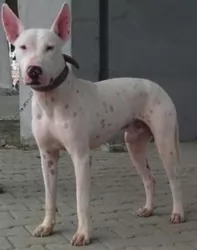 The Gull Terr hails from Pakistan. Having been introduced to the country by the British Raj, the dog has always been valued for its guarding and fighting abilities.
The Gull Terr hails from Pakistan. Having been introduced to the country by the British Raj, the dog has always been valued for its guarding and fighting abilities.
The British army, on bringing English Bull Terriers with them, mated them with local dogs. The dog was in other words, created from the old bull terrier which became extinct, and the Bully Kutta.
The Gull Terr or Pakistani Bull Terrier as he is known is a rare breed of dog. Today they are usually found in rural areas of Pakistan as well as in the Indian Panjab area, becoming popular as both pet and watchdog. It is no longer used for dog fighting as this has been banned.
 The Pembroke Welsh stands at between 25 and 30cm in height and weighs between 11 and 14kg.
The Pembroke Welsh stands at between 25 and 30cm in height and weighs between 11 and 14kg.
The coat is thick and shortish and can be fawn or a mix of colors such as white, cream, tan and black. The coat sheds quite a bit. Some of these dogs are born with their tail naturally short while others have the tail docked to give it that distinct look.
Pembroke Welsh Corgis are loving dogs and with their human families, they want to become involved with their lives. They like to please their owners and are therefore easy to train and socialize, becoming very obedient and amicable.
They’re alert, intelligent dogs and make great watchdogs too. They get on well with other pets in the home as well as children.
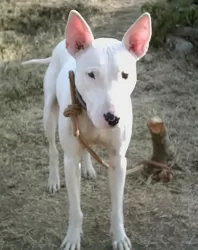 As a medium sized dog, the muscled Gull Terr stands as 45 – 66cm in height and weighs in the area of 40 – 45kg.
As a medium sized dog, the muscled Gull Terr stands as 45 – 66cm in height and weighs in the area of 40 – 45kg.
The dog has a short, smooth coat which is white, but you may find some black spots on him. He has a egg shaped head, ears are naturally erect, dark slanted eyes, and he has a long tail which is held upwards. Muscled and agile, he is a powerful working breed and makes a good watchdog.
This is an aggressive dog breed, and first-time dog owners might want to have a more amicable kind of pet to start off with.
He is a fearless dog, somewhat aggressive and suspicious towards strangers and therefore wants to protect his owner from them. With training and socialization he can be good with children in the home, although he is inclined to be boisterous and stubborn. He has fierce protective instincts, even though he is considered not as aggressive as some other Pakistani dog breeds.
The Gull Terr will need an experienced dog handler. Even though he has been a fighter in his day, he is capable of being an excellent family pet as well. You won't have trouble training him as he is intelligent. He then becomes more obedient and more manageable. He is a very active dog and therefore he won't fit into city dwelling where there are small spaces. He needs a place to run and on top of that he will require a good deal of exercise.
 British royalty has always loved the Pembroke Welsh Corgi and why not? He is loving, energetic, feisty, gentle, calm, friendly and intelligent.
British royalty has always loved the Pembroke Welsh Corgi and why not? He is loving, energetic, feisty, gentle, calm, friendly and intelligent.
Able to adapt to life in the city or the countryside, he will however need to be exercised every day as he has always been a herding- and working dog, used to working.
If you’re willing to bring the Pembroke Welsh Corgi into your home, he’ll show you what a splendid pet and companion he can be for you too.
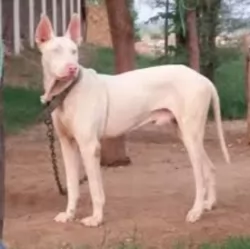 Your Gull Terr love the attention he receives from his human family and he won’t flourish at all if he is put into the back yard for watch dog purposes only. He is a dog that needs to come indoors to be with his family.
Your Gull Terr love the attention he receives from his human family and he won’t flourish at all if he is put into the back yard for watch dog purposes only. He is a dog that needs to come indoors to be with his family.
He tends to be somewhat aggressive and this is why he isn’t looked upon as the ideal pet for first-time dog owners and those with young children in the home.
He is a confrontational dog, willing to enter into a fight with provocation. Strong willed he will require early training and socialization, and when he is brought up by a firm, consistent, kind owner, he can get over his aggression and become a loyal, devoted, protective and loving pet.
 Pembrokes can live to be between 12 to 15 years. With good care they can live to be a ripe old age, but just like with any other dog, they can become ill with any of the many common dog illnesses there are.
Pembrokes can live to be between 12 to 15 years. With good care they can live to be a ripe old age, but just like with any other dog, they can become ill with any of the many common dog illnesses there are.
Some of these diseases are hip dysplasia, monorchidism and degenerative myelopathy. Being a small or short dog, they are also prone to obesity.
This is a condition where only one testicle descends and the other isn’t able to descend into the scrotum. Both testicles should be in the scrotum by 2 months of age. Monorchidism is usually genetic and you may find your dog licking his genital area quite a bit.
If you suspect your dog has monorchidism, you will need to make an appointment with your veterinarian.
This is a progressive disease of the spinal cord and is usually seen in older dogs, starting with your dog losing coordination in the hind limbs.You’ll notice your dog dragging his feet.
As the disease progresses, the limbs weaken and the dog even has difficulty with standing. Eventually the dog is unable to walk. With time your pet even suffers with urinary and fecal incontinence. Fortunately it isn’t a painful disease but you will want to speak to your vet for advice.
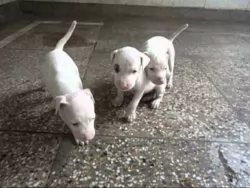 The Gull Terr has a deep chest and this means he is more prone to bloat, a condition known as gastric dilation volvulus.
The Gull Terr has a deep chest and this means he is more prone to bloat, a condition known as gastric dilation volvulus.
Your pet's stomach fills with air and this leads to decreased blood flow to vital organs. The stomach can twist and this is when the condition becomes life threatening as blood supply to the stomach is cut off. Instead of feeding him large meals, feed him smaller meals more frequently.
Deafness in your pet can be temporary or permanent, in one ear or both. There are are so many reasons why your pet could be deaf and it could be a birth defect, an infection or old age. Certain dogs such as the white coated Gull Terr are also more predisposed to congenital deafness.
Get him to the vet who will examine your dog’s ear canal for wax and debris and discuss the way to go for your beloved pet.
 If you bring a puppy home, make sure he gets his puppy vaccines at 8 weeks of age.
If you bring a puppy home, make sure he gets his puppy vaccines at 8 weeks of age.
Your puppy requires 4 meals a day. Make sure to always give your pet the best quality food there is to ensure his health. Avoid giving him spicy, human food. Dogs like simple, consistent diets which don’t upset the stomach. If you buy him commercially manufactured food, buy the best quality one that isn’t full of preservatives, colorants and fillers. Try and mix in some homemade food occasionally such as chopped up boiled chicken, brown rice or pasta and some cooked vegetables such as sweet potato, spinach and carrots. A little bit of raw meat occasionally will do wonders for your pet and he will have more energy, a shinier coat, less skin allergies and less inflammation.
Always ensure your pet has a constant supply of fresh, cool water.
Brush the Pembroke Welsh Corgi’s hair twice a week. Feel for any unusual lumps while doing this. Check inside and outside his ears for ticks and fleas and ear infections.
Trim his nails.
Make sure if he goes outside that he has a shady spot to lie down in.
Exercise him. Take him on walks.
Give him your love and attention.
Take him to the vet when you can see that he is sick.
Have your dog spayed or neutered if you don’t intend for it to have puppies.
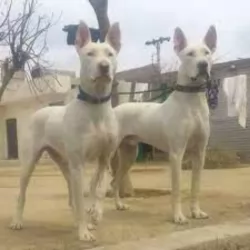 Easy to look after with his short coat, the Gull Terr will only require a brushing twice a week to keep the coat shiny and healthy.
Easy to look after with his short coat, the Gull Terr will only require a brushing twice a week to keep the coat shiny and healthy.
Because his coat is white, it can show dirt easily, and it will simply require taking a damp cloth and wiping the mark off him. You don't want to be bathing him often as this dries his skin out – rather just wipe the coat down.
Your Gull Terr is a highly energetic dog and he loves nothing more than to be involved in robust exercise and games. He is best suited in a home with large grounds and if you do opt to have him in the city, you will have to pay close attention to his exercise needs – lots of walks, runs, ball games, swimming and running with you as you cycle.
You want to be sure that your energetic Gull Terr has a healthy diet full of important proteins, fats, and carbohydrates.
Protein is always important for a dog like this and you want to make absolutely sure that apart from his high quality kibble, you mix in raw meat from time to time as well as cooked chicken, fish, brown rice and vegetables.
When looking for a commercially manufactured dog food, look for high-quality animal protein as a top ingredient. Make sure he always has fresh, cool water available to him.